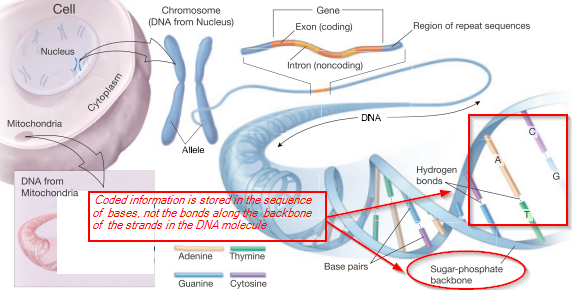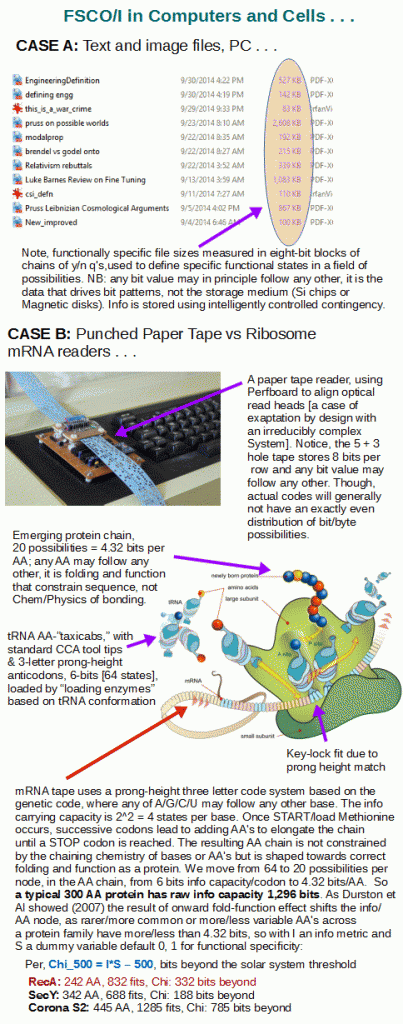A: One of the old sayings of WW II era bomber pilots was that flak gets heaviest over a sensitive target. So, when something as intuitively obvious and easily demonstrated as configuration-based, functionally specific complex organisation and/or associated (explicit or implicit) information — FSCO/I — becomes a focus for objections, that is an implicit sign of its central importance and potential impact on the prevailing a priori materialism school of thought. So, it is appropriate to pause, headline and note for record its source in the works of Orgel, Wicken and Thaxton et al (where Dembski’s link to CSI is also important, cf here from a few days ago; as is the metric approach by Trevors, Abel, Durston Chiu et al, cf. this 2007 paper).
So, let’s start with noted OoL researcher, J. S. Wicken, in 1979, who brought the ingredients together in an article in the peer reviewed literature — and yes, this is before there was an ID movement (indeed this helped spark its emergence):
>>‘Organized’ systems are to be carefully distinguished from ‘ordered’ systems. Neither kind of system is ‘random,’ but whereas ordered systems are generated according to simple algorithms [i.e. “simple” force laws acting on objects starting from arbitrary and common- place initial conditions] and therefore lack complexity, organized systems must be assembled element by element according to an [originally . . . ] external ‘wiring diagram’ [–> specification] with a high information content [–> chain of y/n q’s in some structured description language to specify nodes- and- arcs mesh towards function based on the configured elements interacting to give a systems level synergistic effect] . . . Organization, then, is functional complexity and carries information. It is non-random by design or by selection, rather than by the a priori necessity of crystallographic ‘order.’ [“The Generation of Complexity in Evolution: A Thermodynamic and Information-Theoretical Discussion,” Journal of Theoretical Biology, 77 (April 1979): p. 353, of pp. 349-65. (Emphases and notes added. Nb: “originally” is added to highlight that for self-replicating systems, the blue print can be built-in.)]>>
This is already enough to be decisive.
We have here all the elements of FSCO/I, only requiring setting up an acronym. And, in the peer-reviewed literature. With the wiring diagram reference already pointing to the world of technology to indicate just how pervasive and familiar this phenomenon is. Further to this, obviously, a
s-t-r-i-n-g-_-o-f-_-g-l-y-p-h-s-_-e-x-p-r-e-s-s-i-n-g-_-a-_-c-o-d-e-d-_-m-e-s-s-a-g-e
. . . is an instantiation of the wiring diagram based, element by element assembled nodes-arcs mesh.
This instantly means texts of original posts, comments (including those composed to object to the FSCO/I concept) and D/RNA alike, are manifestations of the same phenomenon, FSCO/I. Here, let us behold the ribosome in action as compared to FSCO/I in a PC-based punched tape reader:

Where also, just for fun, let’s look yet again at the good old 6500 C3 CT Mag fishing reel, showing the wiring diagram, nodes-arcs pattern that is patently informational:
Back in 1973, Orgel went on record, too:
>>. . . In brief, living organisms are distinguished by their specified complexity. Crystals are usually taken as the prototypes of simple well-specified structures, because they consist of a very large number of identical molecules packed together in a uniform way. Lumps of granite or random mixtures of polymers are examples of structures that are complex but not specified. The crystals fail to qualify as living because they lack complexity; the mixtures of polymers fail to qualify because they lack specificity . . . .
[HT, Mung, fr. p. 190 & 196:] These vague idea can be made more precise by introducing the idea of information. Roughly speaking, the information content of a structure is the minimum number of instructions needed to specify the structure. [–> this is of course equivalent to the string of yes/no questions required to specify the relevant “wiring diagram” for the set of functional states, T, in the much larger space of possible clumped or scattered configurations, W, as Dembski would go on to define in NFL in 2002, also cf here, here and here (with here on self-moved agents as designing causes).] One can see intuitively that many instructions are needed to specify a complex structure. [–> so if the q’s to be answered are Y/N, the chain length is an information measure that indicates complexity in bits . . . ] On the other hand a simple repeating structure can be specified in rather few instructions. [–> do once and repeat over and over in a loop . . . ] Complex but random structures, by definition, need hardly be specified at all . . . . Paley was right to emphasize the need for special explanations of the existence of objects with high information content, for they cannot be formed in nonevolutionary, inorganic processes [–> of course, that novel FSCO/I beyond 500 – 1,000 bits can be formed by even evolutionary processes is the precise issue at stake . . . the search space based and empirical observation answer is, no, incremental evolutionary change is within an island of function, not something that is observed to give rise to a novel body plan. And this holds with redoubled force for the OoL; hence the design theory movement].
[The Origins of Life (John Wiley, 1973), p. 189, p. 190, p. 196. Of course, that immediately highlights OOL, where the required self-replicating entity is part of what has to be explained (cf. Paley here), a notorious conundrum for advocates of evolutionary materialism; one, that has led to mutual ruin documented by Shapiro and Orgel between metabolism first and genes first schools of thought, cf here. Behe would go on to point out that irreducibly complex structures are not credibly formed by incremental evolutionary processes and Menuge et al would bring up serious issues for the suggested exaptation alternative, cf. his challenges C1 – 5 in the just linked. Finally, Dembski highlights that CSI comes in deeply isolated islands T in much larger configuration spaces W, for biological systems functional islands. That puts up serious questions for origin of dozens of body plans reasonably requiring some 10 – 100+ mn bases of fresh genetic information to account for cell types, tissues, organs and multiple coherently integrated systems. Wicken’s remarks a few years later as already were cited now take on fuller force in light of the further points from Orgel at pp. 190 and 196 . . . ]>>
No surprise then, that Thaxton, Bradley and Olsen, in the first technical ID book, The Mystery of Life’s Origin [TMLO], would summarise the state of play c. 1981 – 84:
>>Yockey7 and Wickens5 [sic] develop the same distinction, that “order” is a statistical concept referring to regularity such as might characterize a series of digits in a number, or the ions of an inorganic crystal. On the other hand, “organization” refers to physical systems and the specific set of spatio-temporal and functional relationships among their parts. Yockey and Wickens note that informational macromolecules have a low degree of order but a high degree of specified complexity. In short, the redundant order of crystals cannot give rise to specified complexity of the kind or magnitude found in biological organization; attempts to relate the two have little future. [–> save as dismissive rhetoric, of course] [TMLO, Thaxton et al [TBO], (Dallas, TX: Lewis & Stanley, 1984), p.130. ]>>
(This passage is in fact the specific source of my abbreviation- for- convenience; in response to Patrick May et al, Dr Torley, a medical doctor active at Loma Linda whose name escapes me at the moment [U/D, 111:12 loc: Paul Giem] and I constructed a simplified metric approach that in the end is linked to the Dembski metric via a log reduction that converts to the information form, as appears in an infographic above. The Durston et al approach can be fed into that simple metric, as is shown.)
So, we can see for the record just where the abbreviation FSCO/I comes from, and that as such it does not need any grand elaboration in the literature, as the relevant underlying analysis is there in increasing abundance.
Instead of a secondary and in the end distractive debate over credibility or otherwise of terminology . . . here, an acrostic summary of a descriptive phrase, let us re-focus on the substantial issues. END

